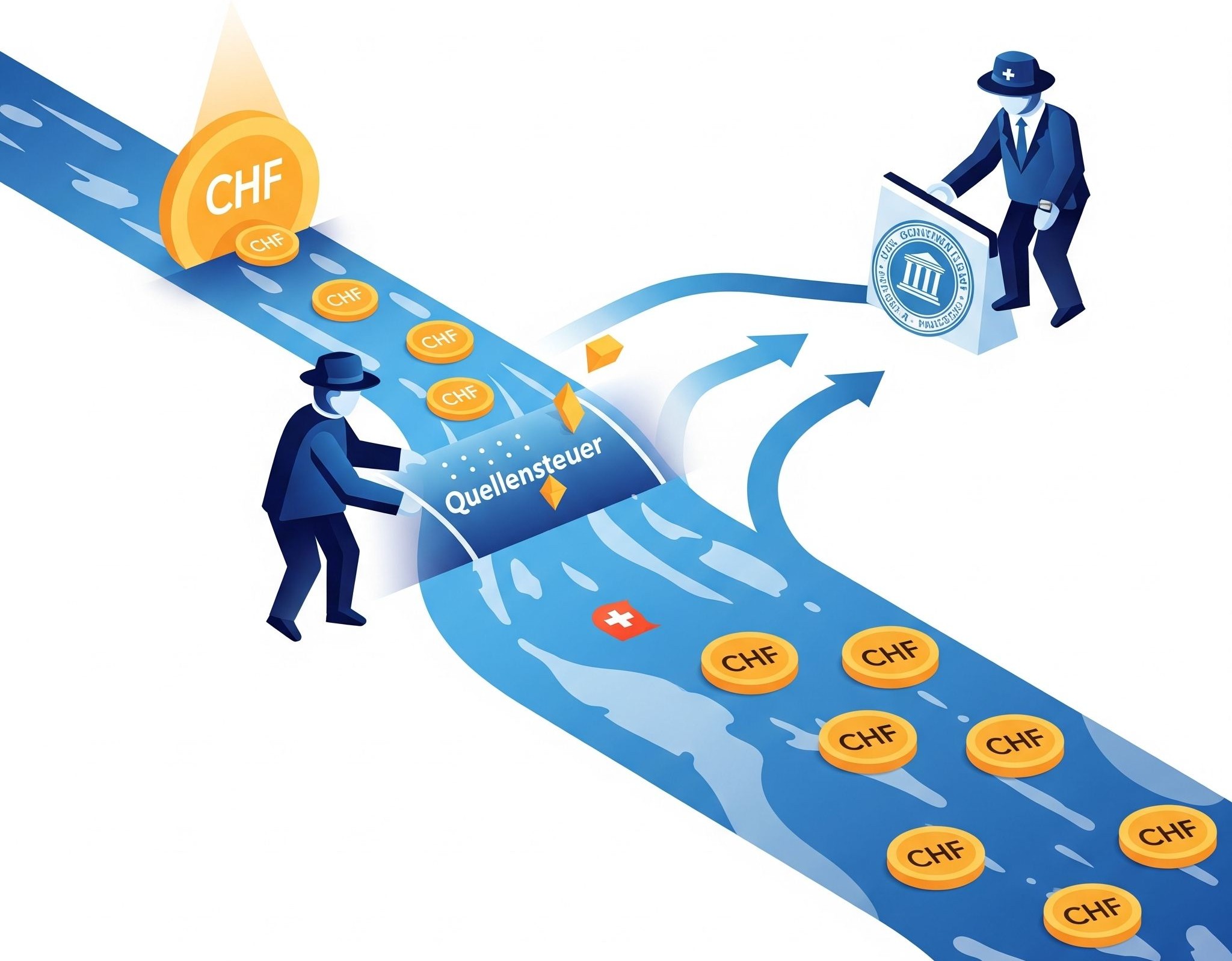Withholding tax (Quellensteuer) in Switzerland: here's what you need to know

As a physiotherapist working in Switzerland, you are likely to come into contact with the withholding tax (Quellensteuer). This may sound complicated, but it's actually pretty easy if you know how it works. We'll explain everything you need to know about this tax.
What exactly is withholding tax?
Withholding tax is a tax that is deducted directly from your salary before you receive your salary. Your employer automatically withholds this and pays it on to the tax authorities. The system was designed to ensure that foreign employees pay their taxes in Switzerland without you having to think about it yourself.
As an EU citizen working in Switzerland, you are almost always subject to withholding tax. This applies to physical therapists from Belgium, the Netherlands, Germany, France, Italy and all other EU countries that do not yet have a permanent residence permit.
Exceptions are:
- You have an Ausweis C (settlement permit)
- You are married to someone who is a Swiss citizen or has an Ausweis C.
How much withholding tax do you pay in Switzerland?
The amount of your withholding tax depends on three important factors: the canton where you work, your family situation and your income. Zurich has different rates than Bern or Basel, and your personal circumstances determine what rate applies to you.
The most important rates are:
- Rate A: Single with no kids
- Rate B: Married, partner does not work
- Rate C: Married, both partners work
- Rate H: Single with children
Special rates often apply to border commuters from EU countries. German commuters, for example, pay 4.5% of their gross salary, while French commuters can fall under other arrangements thanks to bilateral treaties.
To give you an idea, as a single physiotherapist in Zurich with a salary of CHF 7,000 per month, you pay around 12-15% withholding tax. That amounts to around CHF 850-1,050 per month. This seems like a lot, but remember that this is your total tax payment. So there are no extra taxes on top!
Automatic high-income tax returns
Do you earn more than CHF 120,000 gross per year? Then you will automatically receive a Swiss tax return, the so-called nachträgliche ordentliche Veranlagung. This happens automatically: you don't have to ask for it.
This return calculates exactly how much tax you have to pay and compares that with what you have already paid via withholding tax. For most physiotherapists, this means that you get something back, because you often pay a little more than strictly necessary via the withholding tax.
Getting a refund from paid withholding tax
Even if you earn less than CHF 120,000, you can always voluntarily submit a tax return do. This can be very beneficial, especially as a physical therapist. This is because you can deduct a lot of your professional expenses.
Important deductions for physical therapists:
- Courses and refresher courses
- Professional literature and magazines
- Travel costs to conferences
- Specific workwear
- Pension investment (2nd pillar)
- Deposits in column 3a (maximum CHF 7,258 in 2025)
- High medical costs that are not covered by insurance
The beauty of the Swiss system is that many costs that are not or hardly deductible in other countries do count here. Many physical therapists underestimate how much they actually spend on their professional development.
Crucial deadline: You must file your application by March 31 of the year after the tax year. If you miss this date, you can no longer file a report. This rule is strictly enforced.
Tips for your tax return
- Keep all your receipts for job-related expenses throughout the year. A simple map or digital app can earn you hundreds of francs at the end of the year. For example, many EU physiotherapists forget the costs of membership in professional associations or subscriptions to professional magazines.
- Pension purchases can be a smart move. If you have space in your second pillar (you'll see this on your annual pension statement), you can make an additional deposit and deduct it entirely from your taxes. Ask your employer about your current pension situation.
- Check your paycheck regularly to see if the correct withholding tax rate is being applied. Are you married but are being pulled off like you're single? Then you pay too much and this has to be corrected.
Changes in your situation
If something changes in your personal situation, this may affect your withholding tax. Always report these changes to your employer immediately:
- Getting married or getting divorced
- Having kids
- Partner who starts or stops working
- Ausweis C received
These changes usually take effect from the first day of the month after the change, so the sooner you report it, the more you can save.
Returning to your home country
If you decide to return to your home country, you may be able to get a withholding tax refund from your Swiss pension fund. You can get money back from both your second pillar and column 3a under certain conditions. Of course, this requires a few forms that must be checked by the tax authorities of your home country. So take the time to do this and get help from a tax advisor in the country you're moving to.
Get help with your tax return
If you have simple questions, you can contact the cantonal tax authorities, which often help free of charge and usually also have English-speaking employees. However, for your complete tax return, it's smart to get professional help.
Specialist tax advisors who have experience with EU citizens in Switzerland can help you find all deductions. Many physical therapists discover that they can recover hundreds or even thousands of francs per year via a professional declaration. The online tax advice office Taxea.ch — where we are at takeoff have a partnership with — specializes, for example, in assisting foreign professionals.
The most important thing to remember is that the Swiss withholding tax system is there to make things easier for you. You pay your taxes automatically and, with the right guidance, you can often get a lot of money back.
Read more about Switzerland
Tips, tricks and more insights about living and working in this beautiful country


.jpg)

